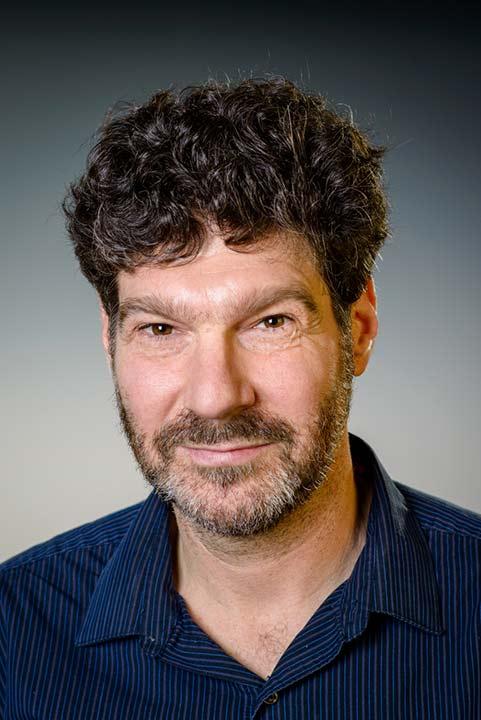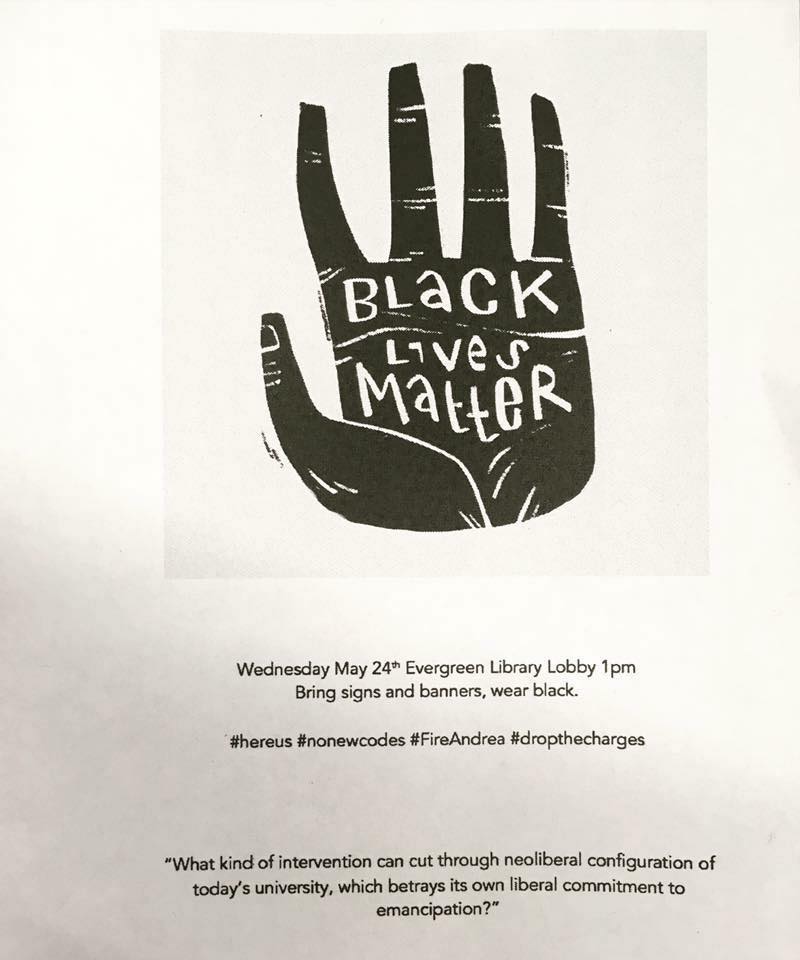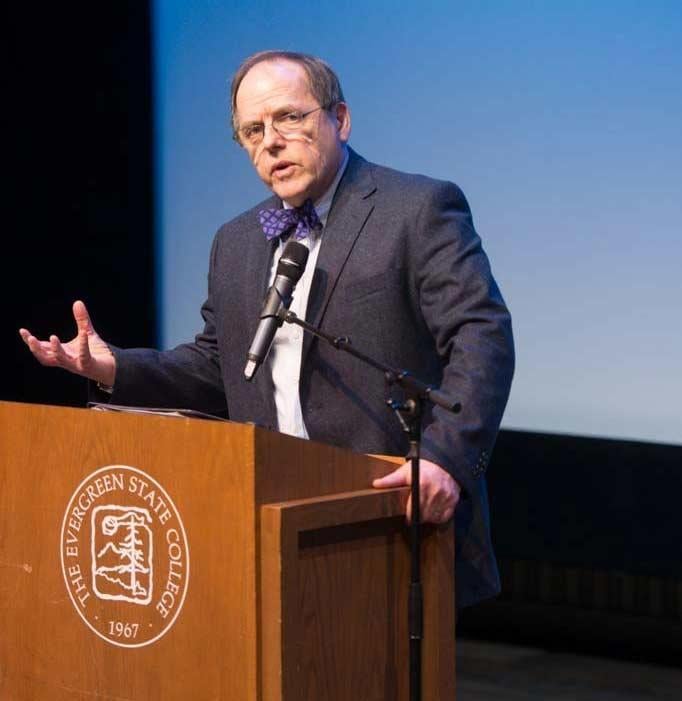You have /5 articles left.
Sign up for a free account or log in.
In the heated debates of campus politics these days, it is not unusual for some groups (on or off campus) to demand the firing of a faculty member. But the rancor at Evergreen State College over the last week stands out. There, a professor whom some students want fired was told by the campus police chief that, out of concern for his safety, he should stay off campus for a few days. He did, teaching a class nearby in Olympia, Wash., and is not sure when he can return to campus.
 The professor's critics say he's racist, and groups of students have been holding demonstrations -- sometimes turning into marches across campus and impromptu searches for the professor. They have been chanting that racist professors must be fired. Bret Weinstein (right), a biology professor, is the main target and is the faculty member who moved his class off campus. "Fire Bret" graffiti is visible on campus. But students are also demanding the dismissals of one or more police officers, that the campus police sell off all of its weapons and various other policy changes.
The professor's critics say he's racist, and groups of students have been holding demonstrations -- sometimes turning into marches across campus and impromptu searches for the professor. They have been chanting that racist professors must be fired. Bret Weinstein (right), a biology professor, is the main target and is the faculty member who moved his class off campus. "Fire Bret" graffiti is visible on campus. But students are also demanding the dismissals of one or more police officers, that the campus police sell off all of its weapons and various other policy changes.
The debate over Weinstein has become particularly intense. He and his supporters say that he's not a racist and is standing up for principles of equity. The president of Evergreen State, George Bridges, says Weinstein's job is not in danger. But Weinstein says Bridges has not taken the kind of public stand that is required when a professor's right to speak out is under attack. Weinstein's student critics, meanwhile, say his public defense is shifting attention away from their grievances.
Why is Weinstein so controversial?
He has spoken out on two campus issues, in both cases taking positions he maintains were opposing racism.
‘Day of Absence’
One involved a campus tradition called Day of Absence, which is based on a 1965 play by that name by Douglas Turner Ward. The play is about an imaginary Southern town in which all the black people disappear one day. The idea behind the play is that societies with deeply racist ideas in fact depend on the very people they subjugate. The play is in some sense the inspiration for events like this year's national Day Without Immigrants.
For many years at Evergreen State, minority students and faculty members have observed a Day of Absence in which they meet off campus to discuss campus issues and how to make the college more supportive of all students. Later a Day of Presence reunites various campus groups. Weinstein said he's been aware of the tradition for some time, and never objected to it. But this year, organizers said that on the Day of Absence, they wanted white people to stay off campus. Weinstein opposed this shift, and he posted a message on a campus email list in which he objected to the proposal to ask white people to stay off campus.
"There is a huge difference between a group or coalition deciding to voluntarily absent themselves from a shared space in order to highlight their vital and underappreciated roles (the theme of the Douglas Turner Ward play Day of Absence, as well as the recent Women's Day walkout), and a group encouraging another group to go away," Weinstein wrote. "The first is a forceful call to consciousness, which is, of course, crippling to the logic of oppression. The second is a show of force, and an act of oppression in and of itself."
Weinstein went on to say he would be on campus on the Day of Absence and would encourage a similar stance by white people being asked to stay away. People should "put phenotype aside," he said. "On a college campus, one's right to speak -- or to be -- must never be based on skin color."
That email is one of the reasons Weinstein is being called racist, with students saying his tone belittled the people behind the idea of having a Day of Absence without white people on campus. The other reason cited against Weinstein is that he has come out against a recommendation on faculty hiring by the college's Equity and Inclusion Council. That recommendation, currently under consideration by college leaders, would require an "equity justification/explanation" for all faculty hires.
In an interview, Weinstein said he believes that there are many things colleges can and should do to attract diverse candidates for faculty jobs. But he said the proposal at Evergreen State "subordinates all other characteristics of applicants to one thing." He said that in the sciences, for example, the rationale for faculty positions is to teach science, not to promote equity or diversity. "The most important thing is that the person in front of the room knows something about the subject and has insight in teaching," he said.
Weinstein said he has been stunned to have been shouted at on campus, and to be told that he needs to leave campus because of two positions he took on policy issues. These positions, he stressed, come from his view that all people are equal. And while he said he doesn't believe everyone has to agree with him, he doesn't believe his views should make him a target for being fired -- or for threats to his well-being.
"These students are engaged in a show of force," Weinstein said. "In order for this show of force to look to the outside world as reasonable, there cannot be a diversity of opinion about the issues."
Many of Weinstein's students -- including minority students -- have taken to social media to say that he is a kind and thoughtful teacher and has been supportive of those enrolled in his courses, including minority students.
The Stakes for Students
 The student protest movement includes several coalitions, and leaders were not reachable over the weekend. But many have been posting to social media to offer their perspective. Many on Facebook and Twitter (and in videos of various events on campus) are criticizing sympathetic posts about Weinstein on social media and in conservative press outlets. They have noted the fatal attack on two men in Portland, Ore., Friday -- men who were trying to prevent another man from continuing anti-Muslim invective against two women -- as evidence that minority individuals are the ones in danger in society today.
The student protest movement includes several coalitions, and leaders were not reachable over the weekend. But many have been posting to social media to offer their perspective. Many on Facebook and Twitter (and in videos of various events on campus) are criticizing sympathetic posts about Weinstein on social media and in conservative press outlets. They have noted the fatal attack on two men in Portland, Ore., Friday -- men who were trying to prevent another man from continuing anti-Muslim invective against two women -- as evidence that minority individuals are the ones in danger in society today.
Many of these posts accuse Weinstein of not understanding the stakes for minority students.
One student wrote on Facebook that she was "so dismayed at the professor who is putting his job security ahead of the safety of the students (particularly those who are visibly of color, queer, trans, nonbinary, disabled, etc.) on our campus. And when I say safety, I am not referring to someone's feelings getting hurt. I'm referring to the very real, very close neo-Nazi/white supremacist/alt-right/whatever-you-wanna-call-white-people-who-think-non-white-people-should-die presence in the Pacific Northwest. The same presence which resulted in two deaths in Portland on public transit, in broad daylight, with witnesses, yesterday. Student protesters did not take hostages. Student protesters were not violent. Student protesters did not demand to search vehicles. Student protesters have not taken over the campus. I was there. Were they loud? Yes. Were they angry? Yes. Were they 100 percent a unified and thoroughly organized front? No. That's how this stuff works. Change is messy and loud and confusing and uncomfortable and long, long, long overdue."
Many of the comments on social media by people off campus have said that they don't find Weinstein's objections to the Day of Absence to be racist. As a result, supporters of the Evergreen State students have been making the case that he was wrong to question the new approach to Day of Absence.
One online post said, "That is not an act of oppression, Bret. Part of dismantling white supremacy is giving up white spaces to people of color; it's part of the healing process. And again, I don't think there was anything requiring Bret to participate …. I guess the real issue with reversing the traditional 'who leaves campus' roles is that POC [people of color] on campus won't object to a day without all the annoying white people around and will gladly leave, while white folks will object and throw temper tantrums at the mere suggestion that they give up their traditional space for just one day."
‘The Right to Say What He Wants’
 Bridges (right), the president of Evergreen State, said in an interview Friday that it was important to remember that the Day of Absence was voluntary, and that no white people were forced to participate. He also said he believed that the campus was safe, and that there was a mistaken assumption among many that the protesters were in control of the campus.
Bridges (right), the president of Evergreen State, said in an interview Friday that it was important to remember that the Day of Absence was voluntary, and that no white people were forced to participate. He also said he believed that the campus was safe, and that there was a mistaken assumption among many that the protesters were in control of the campus.
Bridges said that Weinstein's right to speak out has never been threatened and that his job is not in danger. "He has the right to say what he wants," Bridges said. (Evergreen State does not have a traditional tenure system but does have a similar system under which Weinstein is covered.)
In a meeting with students late Friday, Bridges rejected demands that Weinstein and some police officers be fired, saying that the college does not respond to demands that employees be fired. But he announced a number of steps that the college was taking, and he repeatedly praised the protest movement. Among the changes he announced:
- The start of mandatory diversity and cultural sensitivity training for all faculty members. (This measure was adopted with the agreement of the faculty union.)
- The creation of an equity/multicultural center.
- The hiring of a vice president or vice provost who will focus on equity and diversity issues. (The search for this position had already been started.)
- Adoption of a new policy where every official event at the college will start with an acknowledgment that Evergreen State is on land stolen from Native Americans.
On Saturday, Bridges posted a statement in which he said it was important for the college to make students feel secure and for faculty members to feel that their rights to free expression were respected.
"Some students on campus experience racism that interferes with their education. Others, including faculty, believe their freedom of expression is being restricted," Bridges wrote. "These are important issues. Discrimination of any form is not acceptable or tolerated on our campus. Free speech must be fostered and encouraged. We are an institution dedicated to learning. We must treat each other with respect and care. Every faculty member, student and staff member must have the freedom to speak openly about their views."
Bridges went on to say, "We may disagree with each other. However, disagreement is one thing; dehumanization is another. Over the week, a few members of the Evergreen community have used traditional and social media to malign, mock or misrepresent those with whom they disagree. While the majority of students, faculty and staff are fully engaged in the teaching and learning work of the college, a few are on a destructive course of action that hurts themselves and gives a distorted and false impression of our community."
Both the student protest movement and Weinstein and his supporters say they have been maligned in ways such as those Bridges cited. The president did not include any names in his statement.
Weinstein said via email that the statement does not reassure him.
"The president's carefully crafted statement is clearly intended to support a false narrative about the present state of our campus, and the extraordinary events of this past week," he said. "No one at the college has yet acknowledged that I and my students were specifically followed, harassed and doxed. If it is now safe to return, it is only because the intimidation campaign against us backfired so spectacularly and has now been called off as a matter of PR damage control."




